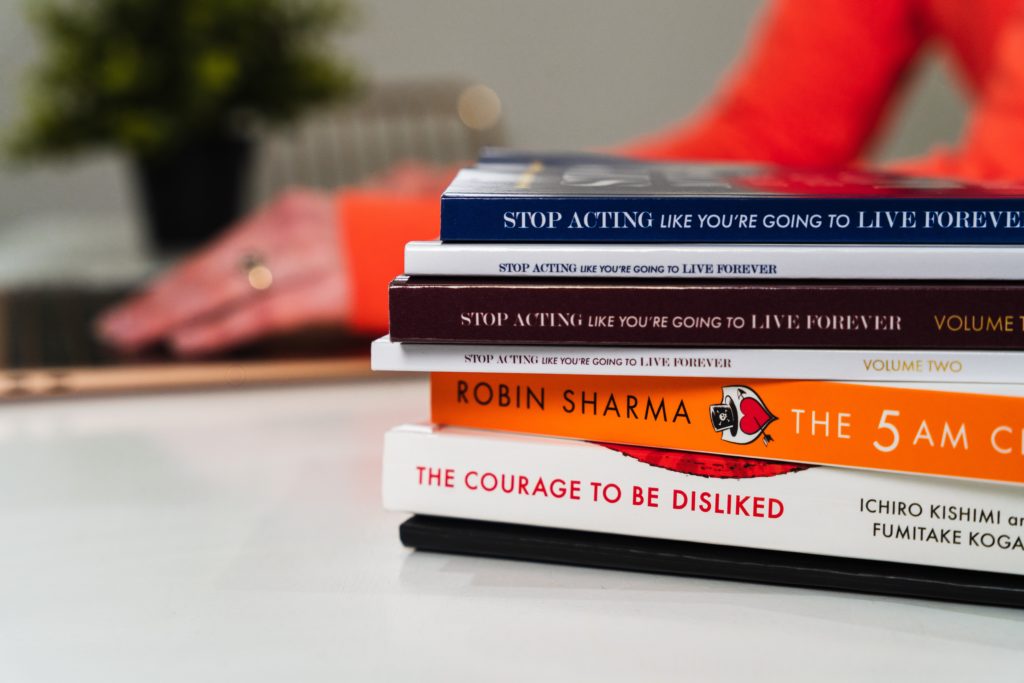
Does the word self-help turn you off? It has definitely been a popular buzzword in our society for decades, but not always for good reasons. That’s because there are many myths about self-help that could prevent you from seeking out much-needed support.
I know it can be hard to be vulnerable about where we want to make improvements, especially as actors and creatives—where much of our lives are in the public eye. Self-help may also feel too woo-woo, self-indulgent or even fraudulent!
But it is the very real process of recognizing where you’re struggling in life and working toward a stronger, calmer and more confident version of YOU. So if that sounds ahhh-mazing…
Here are 4 self-help myths that you should stop believing.
Myth #1: Self-help is One-Size-Fits All
The idea that what works for one person is going to work for everyone sounds ridiculous, but when it comes to self-help, we put a lot of judgments on our own progress. Does my path look like their path? Why does this work for him but not me? I don’t feel better yet; am I doing this wrong? Maybe I’m just not a “self-help” person.
Self-help is not like being a dog person or liking math. It isn’t something you’re either “in to” or not. This is a process of discovering tools that work for you, and it’s as complex as each one of us. Your life experience is not identical to anyone else, so why would your path to healing be the same?
Plus, we’re constantly learning, growing, and evolving, so successful tools and routines will fluctuate too. The way you managed your self-care as a teenager won’t work as well once you’re in your 40s.
Myth #2: It’s All About Your Mindset
Sometimes the problem isn’t your self-esteem. Positive thinking is wonderful, but if it isn’t partnered with action, you will eventually stop believing in those mantras and affirmations.
This is because action precedes motivation. So you need to actually do something first, and once you’ve made an effort (even if it’s not super successful!) your mind rewards your hard work with all the good feels. This, in turn, motivates you to take more actions.
And believe it or not, pessimism is healthy! It is your mind’s natural system to help you recognize potential obstacles and patterns, so you can make better decisions. When you adopt the good-vibes-only mindset, not only do you gloss over lurking problems but you run the risk of sinking yourself further into negative thoughts.
For more on how toxic positivity works and how to combat it, check out this post.
Myth #3: You Can Control Your Life
You may have been taught (by society, your family, coaches and teachers, online influencers, so many people) that your life is made up entirely of your choices. So it stands to reason that if you can just make all the right choices, your life will end up great, right?
Um, no. It doesn’t work like that. Even if it did, wow, imagine the constant pressure!
2020 is a perfect example of how life can be unpredictable, terrifying and life-changing, without any input from any of us. Part of self-help is learning to let👏it👏go and trust the Universe to open up alternative routes out of the chaos.
If you’re struggling to trust the process, especially when it comes to your acting career, check out my tips to help you ease your grip on the steering wheel and enjoy the ride.
Myth #4: You Can Buy Self-Improvement
Oh, you like my happiness? Gee, thanks, just bought it.
I see it, I like it, I want it, I got it.
Oh, wouldn’t it be wonderful if we could order up the best version of ourselves? Just like the Jetsons could push a button and robots would get them ready in the morning? (I’m seriously aging myself here!) Unfortunately, that doesn’t exist.


Yes, you can absolutely learn tips or time-saving hacks to help you improve your habits and self-talk, but assuming they are all the self-help you need is a total myth. “This notion that you’re going to find the quickest hack, to me, is something that reduces effort,” explains developmental psychologist Sasha Heinz, Ph.D., an expert in behavioral change and positive psychology.
When the idea of hard work is removed from the equation, people tend to give up as soon as things become uncomfortable, and it’s in that space where change really happens!
Real talk: change can be painful! You have to get comfortable being uncomfortable. Especially when you’re working through long-held limiting beliefs and childhood trauma. There is no quick fix or class or product you can invest in that will immediately upgrade your life for good.
So, which of these self-help myths surprised you the most? What questions to you still have? Let me know in the comments below.
LOVE + understanding!





+ show Comments
- Hide Comments
add a comment